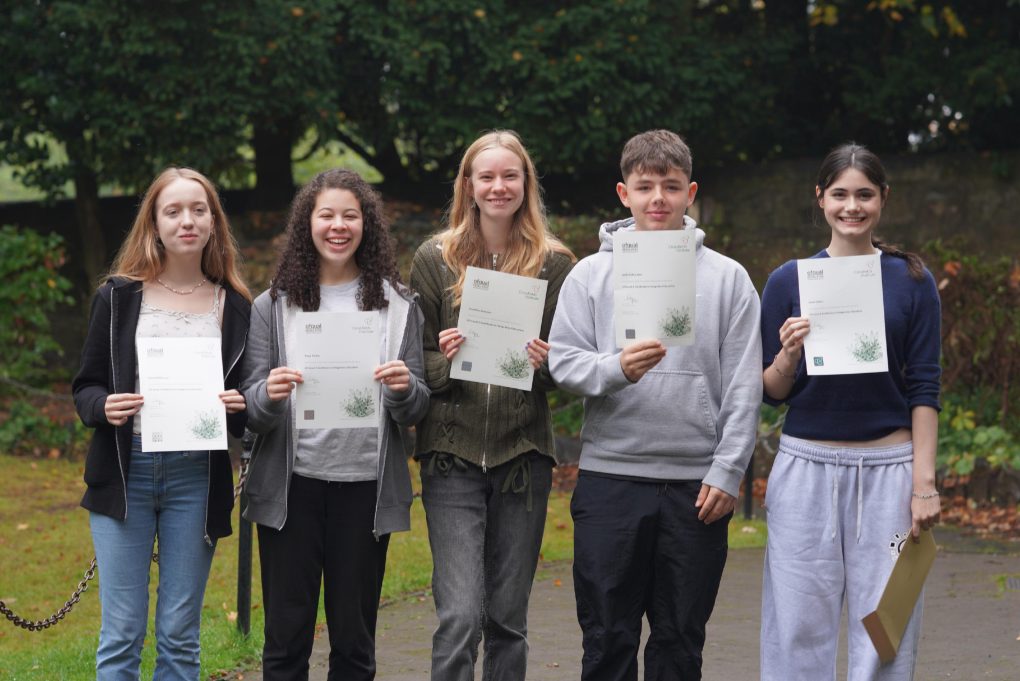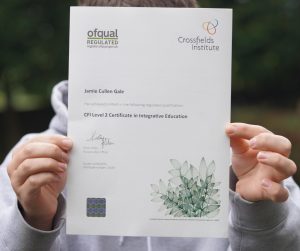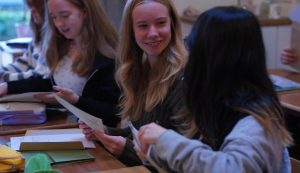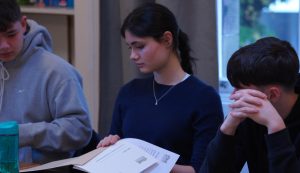Pupils Excel In Suite of Qualifications Developing Eleven Creative Thinking Skills
October 1 2024

Subscribe to our weekly newsletter
Alternatively, receive ESS news in brief through TN Bitesize (WhatsApp Broadcast)
“Still the only suite of qualifications listed and regulated by Ofqual which grades learners more highly when they can recognise that a paradox is unresolvable, and which can validly assess learning by trial and error (heuristic thinking).” Upper School pupils receive their Integrative Education Certificates.
Read on below.
On Tuesday 24th September, pupils in Classes 9 and 10 received their certificated results for Awards and Certificates in Integrative Education. The results were excellent.
- ESS pupils receive their Integrative Education 2024 Results for the Award and Certificate.
- Clas 10 pupils receive their IE Certificate, equivalent to three GCSEs
For the CFI Level 2 Award in Integrative Education (which comprises Module 1 of the full Integrative Education Certificate, based on work completed for the Class 8 Project), 18 learners achieving a Pass, Merit or Distinction. Five of these learners achieved the top grade (Distinction).
For the CFI Level 2 Certificate in Integrative Education (which comprises Module 2: Creative Thinking Skills, and Module 3: Personal & Social Learning, based on work completed during Class 9), all 11 learners achieved Merit or Distinction.
Each Level 2 module in Integrative Education is equivalent to one GCSE. The IEC Certificate is therefore on par with three GCSEs.

Portfolio-based Integrative Education suite of qualifications introduced at ESS in 2019.
The IEC is an innovative qualification, which arose out of the multinational 3-year ‘Acknowledging Creative Thinking Skills (ACTS)’ project founded by members of the Steiner Waldorf Schools Fellowship and supported by funding by the European Union. Edinburgh Steiner School registered as a centre to deliver Integrative Education qualifications in 2019, and they are now an established part of teaching and learning programme.
The IEC has no exams. To achieve the learning outcomes for Modules 2 and 3, pupils instead submit a portfolio of evidence of work which can be drawn from any part of the whole curriculum (including Main Lessons) as well as – uniquely – evidence of ‘non-formal’ and ‘informal’ learning outside of school, such as a record of planning for a family camping trip or inspiration gleaned from participating in a drama club.
Elaine Holt, one the founding members of the ACTS project, wrote in 2018:
There is a growing need for creative solutions to meet an ever-increasing array of social, political, economic and natural challenges, from disaffected youth to climate change, and yet there are fewer opportunities for students to practise the necessary skillset they will need within the current assessment system.
Accepting and working with different thinking and learning styles helps students engage with education again and achieve their potential in a way that makes their learning visible and able to be evaluated. By integrating these learning opportunities within a broad curriculum, free of unduly premature specialisation, students can be assessed within the context of a broader range of learning styles and make visible the key creative thinking skills that are of increasing importance in higher education and the workplace.”
The accreditation of learning completed outside of school is only one of the innovations heralded by Integrative Education. Reflective practice, including personal risk assessment and the importance of self-care, are now firmly established among the learning outcomes for Module 3.

Alistair Pugh (left), Education Manager, Integrative Education Postgraduate and SQA Coordinator
The Creative Thinking Skills themselves – all eleven of them – are now deeply embedded in the DNA of the both the Award and the full Certificate. To my knowledge, this is still the only suite of qualifications listed and regulated by Ofqual which grades learners more highly when they can recognise that a paradox is unresolvable, and which can validly assess learning by trial and error (heuristic thinking).
The flexibility provided by this form of assessment, as well as the interdisciplinarity encouraged by the course specification, allows us, as teachers, to programme a range of stimulating tasks and activities during our timetabled ‘CTS’ lessons in Class 9. Pupils have the opportunity to get under the hood of linguistics before inventing new words; they create job descriptions and ‘person specifications’ for fictitious jobs (such as ‘bridge troll’ or the ‘tooth fairy’) which lays the foundations for thinking about work experience and careers; they debate the problems faced by the prison system and the NHS; and they design a marble run, which requires them to problem- solve like engineers. It’s fun—which is how it should be.
Many congratulations to all those pupils who received their certificates last week, many of whom are now working towards their full Certificate, Modules 2 & 3. All their teachers wish them the best of luck.
Read the full weekly ezine here: Tuesday Notice
News pieces:
School calendar dates
Management Surgeries
Poster Unveiled For Christmas Market
Christmas Craft Workshop Next Saturday
Christmas Market Bulletin #3
Halloween Ceilidh Tickets Selling Fast
Parent Choir Resumes This Wednesday
‘In Action’ Open Tour This Friday
Pupils Shine In Sport Beyond the School Gates
Hands Up Scotland Survey Results
Sally Tsang In Concert With Tom Robertson
Pupils Excel In Suite of Qualifications Developing Eleven Creative Thinking Skills
Adverts



